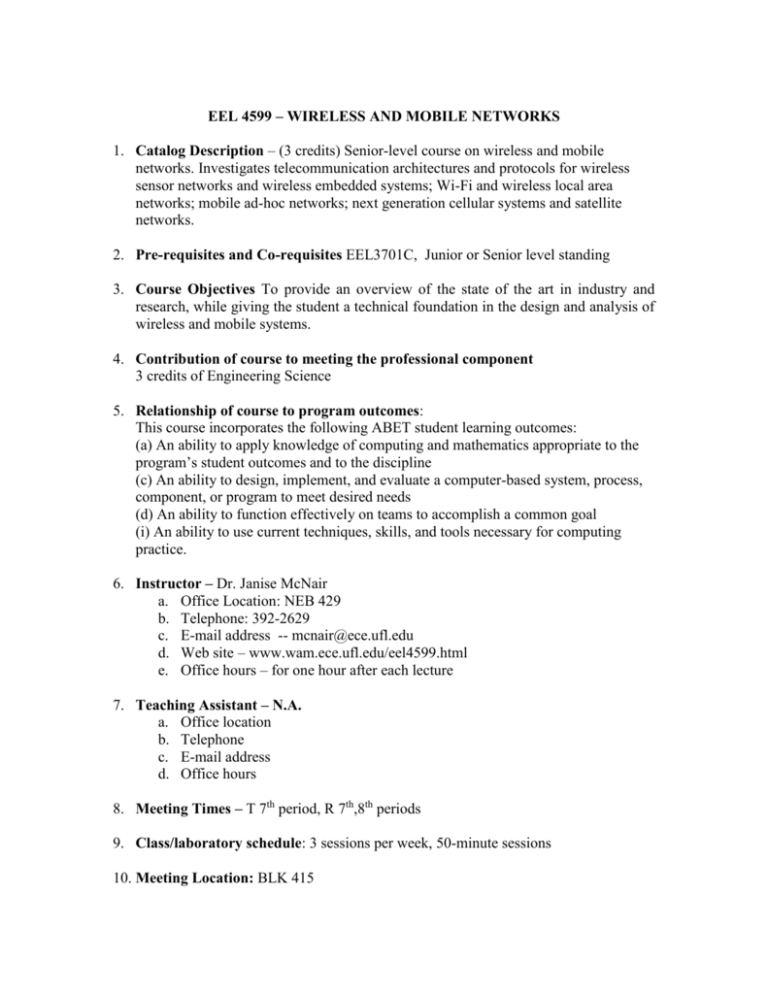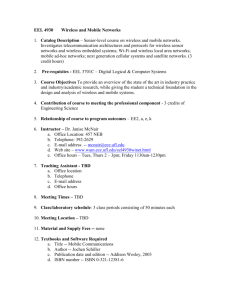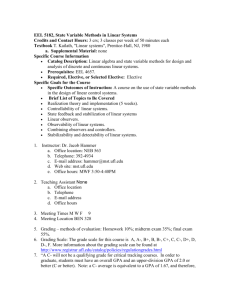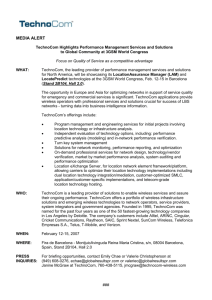Spring 2016 - Associate Chair Home
advertisement

EEL 4599 – WIRELESS AND MOBILE NETWORKS 1. Catalog Description – (3 credits) Senior-level course on wireless and mobile networks. Investigates telecommunication architectures and protocols for wireless sensor networks and wireless embedded systems; Wi-Fi and wireless local area networks; mobile ad-hoc networks; next generation cellular systems and satellite networks. 2. Pre-requisites and Co-requisites EEL3701C, Junior or Senior level standing 3. Course Objectives To provide an overview of the state of the art in industry and research, while giving the student a technical foundation in the design and analysis of wireless and mobile systems. 4. Contribution of course to meeting the professional component 3 credits of Engineering Science 5. Relationship of course to program outcomes: This course incorporates the following ABET student learning outcomes: (a) An ability to apply knowledge of computing and mathematics appropriate to the program’s student outcomes and to the discipline (c) An ability to design, implement, and evaluate a computer-based system, process, component, or program to meet desired needs (d) An ability to function effectively on teams to accomplish a common goal (i) An ability to use current techniques, skills, and tools necessary for computing practice. 6. Instructor – Dr. Janise McNair a. Office Location: NEB 429 b. Telephone: 392-2629 c. E-mail address -- mcnair@ece.ufl.edu d. Web site – www.wam.ece.ufl.edu/eel4599.html e. Office hours – for one hour after each lecture 7. Teaching Assistant – N.A. a. Office location b. Telephone c. E-mail address d. Office hours 8. Meeting Times – T 7th period, R 7th,8th periods 9. Class/laboratory schedule: 3 sessions per week, 50-minute sessions 10. Meeting Location: BLK 415 11. Material and Supply Fees -- none 12. Textbooks and Software Required a. Title – Mobile Communications b. Author – Jochen Schiller c. Publication date and edition – 2003, 2nd edition d. ISBN number: 0-321-12381-6 13. Recommended Reading: Wireless Communications and Networks W. Stallings Prentice-Hall, 2002 ISBN 0-13-040864-6 14. Course Outline (provide topics covered by week or by class period) a. b. c. d. e. f. g. h. i. j. Introduction/Admin – 1 period Signals– 6 periods Multiplexing – 3 periods Modulation – 3 periods Cellular Systems – 6 periods Satellites – 3 periods Wireless LANs – 6 periods Wireless Sensor Networks – 3 periods Wireless Security – 1 period Project Presentations – 6 periods 15. Attendance and Expectations Class attendance is required. A class participation grade will be assessed, based on class participation during group presentations. 16. Grading – Homework (15%), 2 midterm exams (25% each), 2 Projects (15% each), Class Participation (5%) 17. Grading Scale –For information on UF grades and grading policies, please visit: http://gradschool.ufl.edu/catalog/current-catalog/catalog-generalregulations.html#grades Note: In order to graduate, undergraduate students must have an overall GPA and an upper-division GPA of 2.0 or better (C or better). A C- average is equivalent to a GPA of 1.67, and therefore, it does not satisfy this graduation requirement. 18. Make-up Exam Policy There will be no make-up exams, except for rare, unavoidable cases (as determined by the instructor), for which the student has provided verifiable documentation. 19. Honesty Policy – All students admitted to the University of Florida have signed a statement of academic honesty committing themselves to be honest in all academic work and understanding that failure to comply with this commitment will result in disciplinary action. This statement is a reminder to uphold your obligation as a UF student and to be honest in all work submitted and exams taken in this course and all others. 20. Accommodation for Students with Disabilities – Students requesting classroom accommodation must first register with the Dean of Students Office. That office will provide the student with documentation that he/she must provide to the course instructor when requesting accommodation. 21. UF Counseling Services – Resources are available on-campus for students having personal problems or lacking clear career and academic goals. The resources include: University Counseling Center, 301 Peabody Hall, 392-1575, Personal and Career Counseling. SHCC mental Health, Student Health Care Center, 392-1171, Personal and Counseling. Center for Sexual Assault/Abuse Recovery and Education (CARE), Student Health Care Center, 392-1161, Sexual assault counseling. Career Resource Center, Reitz Union, 392-1601, Career development assistance and counseling. 22. Software Use – All faculty, staff and students of the University are required and expected to obey the laws and legal agreements governing software use. Failure to do so can lead to monetary damages and/or criminal penalties for the individual violator. Because such violations are also against University policies and rules, disciplinary action will be taken as appropriate. We, the members of the University of Florida community, pledge to uphold ourselves and our peers to the highest standards of honesty and integrity.






